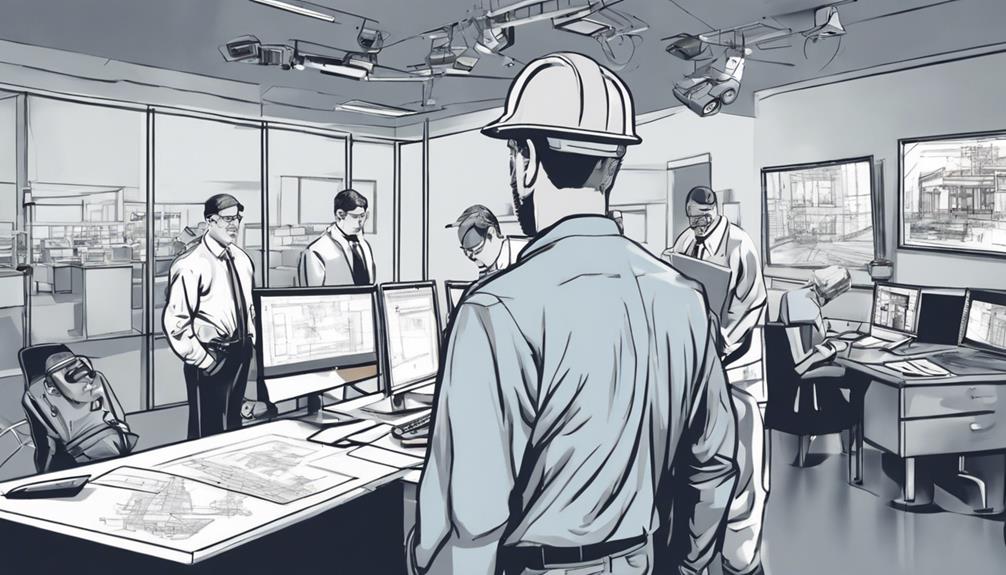You might be surprised to learn that just last week, a friend mentioned how unprepared their business was for a security consultation. During such a meeting, you can expect a thorough evaluation of your vulnerabilities, alongside discussions about your current security measures. To make the most of it, you'll want to review your existing protocols and gather relevant documentation. But what specific questions should you ask, and how can you guarantee your team is ready for the recommendations that follow?
Key Takeaways
- Expect an initial meeting to outline objectives and gather information on current security measures and threats affecting your business.
- Be prepared to discuss key vulnerabilities identified through risk assessments and how they impact your security posture.
- Collect and present relevant documentation, including current security policies, incident reports, and training materials for thorough evaluation.
- Ask essential questions about physical and cybersecurity measures, incident response protocols, and employee training levels to maximize consultation value.
- After the consultation, implement recommendations promptly, establish ongoing training programs, and schedule follow-up assessments to monitor security effectiveness.
Understanding Security Consultations

When it comes to security consultations, many people overlook the intricacies involved in the process. A detailed security assessment is essential for identifying vulnerabilities within your organization. This assessment goes beyond surface-level observations, delving into the specific risks that threaten your assets and operations. You need to understand that effective risk management isn't just about mitigating potential threats; it's about aligning your security strategy with your business objectives. By engaging in a thorough consultation, you empower yourself with insights that can lead to informed decisions. This proactive approach not only safeguards your resources but also enhances your competitive edge. Ultimately, grasping these nuances enables you to take charge of your security posture, ensuring you're prepared for any challenges that may arise.
Key Steps in the Consultation
A well-structured security consultation involves several key steps that lay the foundation for effective risk management. You'll begin by establishing clear communication strategies, ensuring all relevant stakeholders are engaged. Following this, a thorough risk assessment is conducted to identify vulnerabilities within your organization.
Key steps include:
- Initial meeting: Discuss objectives and expectations.
- Information gathering: Collect data on current security measures and threats.
- Risk analysis: Evaluate potential risks and their impact on your business.
- Recommendations: Present tailored strategies to mitigate identified risks.
Preparing Your Business

To prepare your business for a security consultation, start by evaluating your current security measures to understand their effectiveness. Next, identify key vulnerabilities that could pose risks to your operations. Finally, gather relevant documentation that will support a thorough evaluation of your security posture.
Assess Current Security Measures
Evaluating current security measures is essential for any business looking to safeguard its assets and data. A thorough security evaluation allows you to identify strengths and weaknesses, ultimately informing your risk assessment. Here are key areas to examine:
- Access Controls: Review who has access to sensitive data and whether those permissions are justified.
- Data Protection: Assess encryption methods and data storage protocols currently in place.
- Incident Response Plans: Analyze existing procedures for handling security breaches and their effectiveness.
- Employee Training: Evaluate the current level of security awareness among staff and identify training gaps. Businesses can benefit from expert locksmith insights during this evaluation process to enhance their overall security posture.
Identify Key Vulnerabilities
Identifying key vulnerabilities is essential for fortifying your business against potential threats. Begin with a thorough risk assessment that evaluates your current security posture. Pinpoint areas where weaknesses may exist, whether in technology, processes, or human factors. Engage in extensive threat identification to uncover potential dangers specific to your industry and operational environment. This proactive approach allows you to prioritize vulnerabilities based on their potential impact and likelihood of occurrence. By understanding these risks, you can develop targeted strategies to mitigate them effectively. Remember, vulnerability assessment isn't a one-time task; it requires ongoing vigilance to adapt to evolving threats. Position your business strategically by addressing these vulnerabilities head-on, ensuring robust defenses against emerging risks. Don't forget to check out Essential Tips for Maintaining Your Business Security System for additional insights on sustaining your security measures.
Gather Relevant Documentation
Once you've pinpointed key vulnerabilities, the next step involves gathering relevant documentation to prepare your business for a thorough security consultation. This documentation will provide your consultant with essential insights into your security framework and past incidents. Focus on collecting the following:
- Current security policies: Guarantee they reflect your organization's current practices and compliance requirements.
- Incident reports: Gather records of past security breaches or near-misses to highlight patterns and areas for improvement, as discussed in Enhancing Business Safety Through Security Audits.
- Risk assessments: Include any evaluations that identify potential threats and vulnerabilities.
- Training materials: Provide documentation on employee security training to showcase your commitment to ongoing education.
Essential Questions to Ask
When preparing for a security consultation, it's essential to identify key areas of focus that will shape your discussion. Consider what relevant documentation you'll need to provide a thorough overview of your security posture. Asking the right questions upfront can lead to a more effective consultation and better outcomes for your business.
Key Areas of Focus
Three key areas of focus can greatly enhance your security consultation preparation. By addressing these areas, you'll position your business for a thorough evaluation of both physical security and cybersecurity measures.
- What are the current vulnerabilities in your physical security infrastructure?
- How effective are your existing cybersecurity measures against potential threats?
- What protocols are in place for incident response and recovery?
- How do you guarantee that all employees are trained and aware of security policies?
Understanding these aspects allows you to engage in meaningful dialogue during the consultation, guaranteeing that you maximize the value of the expertise provided. By being proactive in these discussions, you'll enhance your organization's overall security posture and readiness.
Relevant Documentation Needed
To fully prepare for a security consultation, gathering the right documentation is essential. You need to present a detailed view of your security measures and past incidents. Here's a list of relevant documents to collect:
| Document Type | Purpose | Importance |
|---|---|---|
| Security Policies | Outline your protocols and procedures | Sets the foundation for assessment |
| Incident Reports | Provide insight into past security breaches | Helps identify vulnerabilities |
| Risk Assessments | Evaluate potential threats | Critical for prioritizing actions |
| Compliance Records | Show adherence to regulations | Demonstrates due diligence |
| Training Materials | Illustrate staff preparedness | Guarantees team alignment |
These documents will enable a thorough analysis and facilitate impactful discussions during your consultation.
Follow-Up Actions to Consider

Effective follow-up actions are essential for reinforcing the outcomes of your security consultation. By implementing these strategies, you can enhance risk mitigation and guarantee ongoing training for your team. Regular follow-up assessments, as recommended in our Affordable Nationwide Commercial Security Audits and Locksmith Consultations service, provide valuable insights into the effectiveness of implemented security measures. Consider the following actions:
- Review the consultation report: Analyze findings and prioritize areas requiring immediate attention.
- Develop a training schedule: Initiate ongoing training sessions to keep your staff informed about security protocols.
- Implement changes: Act on the recommendations provided, adjusting policies and procedures as needed.
- Monitor progress: Regularly assess the effectiveness of new measures and make necessary adjustments.
Low Rate Locksmith's Services
Many businesses and homeowners often overlook the importance of having reliable locksmith services readily available. Low-rate locksmith services can provide essential emergency services, but it's vital to assess their capabilities thoroughly. You need to evaluate their use of advanced locksmith technologies, which can greatly enhance your security. Trustworthy locksmiths offer not only lock repairs but also installations that meet the latest safety standards. When selecting a service, consider their response times for emergencies and their reputation for quality work. Avoid choosing solely based on price; the cheapest option may compromise your security. Instead, prioritize a locksmith who combines affordability with expertise, ensuring your business remains secure and protected against potential threats. Your safety depends on making informed choices, especially when it comes to 24/7 residential vault and high-security safe services.









